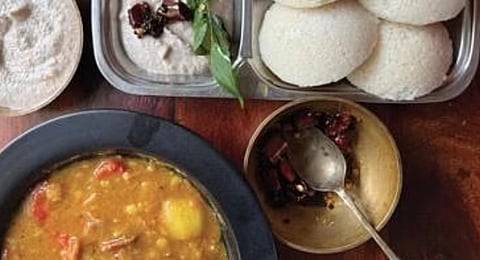

It has been a handful of days since the skies turned cloudy. There are times when the dark clouds threaten unrest, but more often than not, they float past with nothing more than an occasional roar. As a result, what we’ve ended up with is a hot, humid cauldron that’s stewing with the pent-up angst of a feisty Delhi summer.
But on the days when it does pour and the humidity gives way to cool breeze and continuous drizzle, it is steaming hot pillowy idlis drenched in molagapodi and ghee, served with a spicy coconut chutney, that I crave. Interestingly, my latest phase of love for the humble-yet-absolutely regal snack was reinstated when I stumbled upon an old but an absolute gem of a tweet from Shashi Tharoor, who said,
“The taste and refinement to appreciate idlis… is not given to every mortal.” Tharoor’s response came as a reply to the words of a British professor, who deemed idlis to be the “most boring things in the world.” You see, the idli, in my opinion, is perhaps one of the most uncomplicated and unpretentious dishes from across India. That, by itself, makes it an item that is ubiquitous — yet very easy to misunderstand.
Unfortunately, even though I’ve been a fan of idlis for over two decades now, I’ll be honest — I still haven’t gotten myself to make the mavu (the idli batter). While I do find the process tedious, I’m more scared of not fermenting it right — leaving me with disappointing results in the end. Hence, I rely on readymade batters from trusted brands, or even small, independent home-run businesses for my dose of idli batter — such as The Podi Company by Archana Shivan and her mother, based here in Delhi.
Their fresh, homemade batter has always resulted in the fluffiest of idlis, which has over time built my trust in them. In due course, they’ve always ended up sneaking in tiny surprises with my deliveries, through which I’ve discovered their other offerings such as adai batter, molagapodi, chammanthi podi and avakai pickle.
As you open up to Delhi beyond its famous tandoori delights, chaats, butter and cream-loaded gravies and breads, you will realise that the city has quite a few eateries and hawkers whom people swear by when it comes to the comforting idli-sambhar combination.
Carnatic Cafe, a chain of restaurants that started in New Friends Colony almost a decade ago, is a favourite among most, as my Instagram followers assured me. Dried maize hanging from the roof, wooden chairs with rattan work placed around small tables that are placed close to each other, the aroma of ghee soaked dosas and flavourful sambhar, and the beats of Carnatic music welcome you to this eatery. While it is the Malleshwaram 18th Cross dosa that is a crowd puller, for me it is the idlis served with three different chutneys — coconut, peanut and coriander, that does the magic.
As you delve further into Delhi, you realise that more people have their regular go-to joints, when it comes to the humble idli. For advertising veteran Satbir Singh, it is Saravana Bhavan in Connaught Place, while Simran Gill, a north Delhi resident, vouches for Chidambaram in Lodhi Road. Meanwhile, Kishi Arora, a chef and east Delhi resident, swears by Karnatak Sangh — the Karnataka state bhavan in Rao Tula Ram Marg.
Among one of these conversations, what caught my attention was Dwarka resident Sreya Chatterjee’s recommendation — Kutty’s stall, near the Jantar Mantar protest site. You see, if you are a true Dilli-waala, you wouldn’t be a stranger to Kutty’s! Kesavan Kutty’s stall is the place to have soft idlis doused with sambar, crunchy vadas and all varieties of dosa.
The little nook used to be a bustling bus stop area, attracting people who’d indulge in a plate of sambar-idli or sambhar-vada, while waiting for their DTC buses to trundle up. It’s been close to three decades since the stall opened. The pandemic too, gave rise to many home-chefs across the country: people who are the true custodians of their regional cuisine.
One amongst them is Nataraju and his wife Punita, who started their home food venture, Kitchen 108, from their own kitchen. Their menu features signature dishes from Andhra Pradesh and Punjab, the states they belong to. Yet, one of their best-selling items is the Idli-tiffin meal, which I personally vouch for and order very often. What it really goes on to show is how, even without much fanfare and hype, the humble idli is today more ubiquitous all across Delhi, than what you’d imagine it to be.